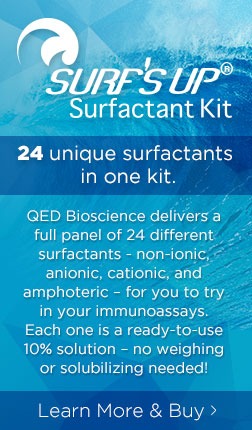Overview
Product Name CCL5 (50181P-50)
Description Recombinant human CCL5, produced in E. coli, corresponds to aa 24-91
Target CCL5
Species Reactivity Human
Applications Migration assay
Source Recombinant human CCL5, produced in E. coli
Properties
Form Lyophilized
Molecular Mass 7.851 kDa
Purity >97%
Background CCL5, also known as Regulated on Activation, Normal T-cell Expressed and Secreted (RANTES), is a proinflammatory chemokine that induces migration and activation of leukocytes, and is also implied in HIV infection. CCL5 binds to cell surface receptors CCR1, CCR3, CCR4, and CCR5. Its biological effects on leukocyte activation and HIV infections is dependent upon concentration and on the binding of cell surface glycosaminoglycans.
Specificity Information
Target Name C-C motif chemokine 5
Target ID CCL5
Alternative Names rHuCCL5
Sequence Location Secreted.
Sequence SPYSSDTTPCCFAYIARPLPRAHIKEYFYTSGKCSNPAVVFVTRKNRQV CANPEKKWVREYINSLEMS
Biological Activity CCL5
Biological Function Chemoattractant for blood monocytes, memory T-helper cells and eosinophils. Causes the release of histamine from basophils and activates eosinophils. May activate several chemokine receptors including CCR1, CCR3, CCR4 and CCR5. One of the major HIV-suppressive factors produced by CD8+ T-cells. RPubMed:1380064, PubMed:15923218, PubMed:16791620, PubMed:17001303, PubMed:23979485, PubMed:8525373, PubMed:9516414}.
Background CCL5, also known as Regulated on Activation, Normal T-cell Expressed and Secreted (RANTES), is a proinflammatory chemokine that induces migration and activation of leukocytes, and is also implied in HIV infection. CCL5 binds to cell surface receptors CCR1, CCR3, CCR4, and CCR5. Its biological effects on leukocyte activation and HIV infections is dependent upon concentration and on the binding of cell surface glycosaminoglycans.
Additional Information
Additional Information Endotoxin Level: <0.01 EU per 1ug of protein by LAL method.Migration Assay in L1.2 cells expressing CCR5.
Handling
Storage 12 months from date of receipt, -20°C to -70°C, as supplied. 1 month, 2°C to 8°C, under sterile conditions after reconstitution. 3 months, -20°C to -70°C, under sterile conditions after reconstitution.
Dilution Instructions Centrifuge tube prior to resuspending. Recommended at 100ug/ml in sterile distilled water.
References & Data Sheet
Data Sheet  Download PDF Data Sheet
Download PDF Data Sheet
 Download PDF Data Sheet
Download PDF Data Sheet


